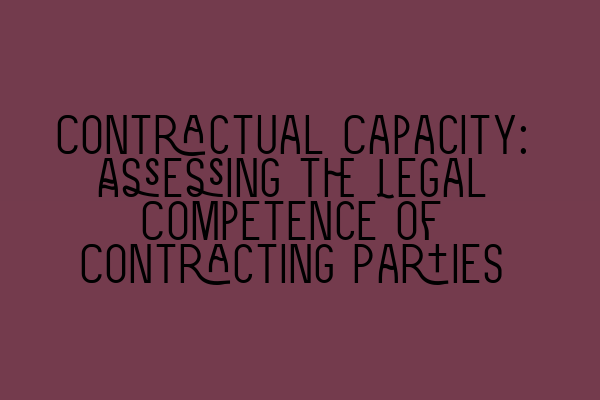Contractual Capacity: Assessing the Legal Competence of Contracting Parties
Welcome to SQE Contract Law! As solicitors, we understand the importance of contractual capacity in ensuring the validity and enforceability of agreements. In this blog post, we will explore the concept of contractual capacity and its significance in contract law. We will delve into the factors that affect an individual’s legal competence to enter into a contract, and the implications of entering into a contract without the necessary capacity. So let’s dive right in!
Understanding Contractual Capacity
Contractual capacity refers to an individual’s legal ability to enter into a contract and be bound by its terms and conditions. It establishes the framework within which contracts are formed, as parties must have the mental capacity and legal competence to understand the nature and consequences of their obligations.
Contractual capacity plays a crucial role in ensuring fairness and protection for all parties involved in a contract. It allows individuals to make informed decisions and enter into agreements freely and voluntarily. Without adequate capacity, a contract may be rendered void or voidable, exposing parties to potential disputes and legal challenges.
Evaluating Capacity
When assessing contractual capacity, several factors come into play:
Age
One fundamental factor is age. In many jurisdictions, minors (individuals below a certain age, typically 18 years old) are deemed to lack the necessary capacity to enter into binding contracts. Minors are considered vulnerable and in need of protection, as they may lack the experience, maturity, and judgment necessary to fully understand the ramifications of their actions.
To learn more about the legal journey to becoming a solicitor, check out our article on Securing Training Contracts: A Roadmap to Becoming a Solicitor.
Mental Capacity
Another critical consideration is mental capacity. Parties must have the mental ability to understand the terms of the contract, appreciate its consequences, and make rational decisions. Individuals suffering from mental illnesses, intellectual disabilities, or impaired judgment may lack the requisite mental capacity to enter into contracts.
For aspiring solicitors, mentorship plays a vital role in nurturing talent and developing legal skills. Read about the importance of mentorship in our article on Mentorship for Aspiring Solicitors: Nurturing Talent in the Legal Field.
Intoxication or Influence
Contracts formed under the influence of intoxication, drugs, or undue influence are often contentious. Individuals who are intoxicated or subject to undue influence may not be in a position to fully understand the terms of the contract or exercise their free will. These situations raise questions about the authenticity and validity of the agreement.
If you’re interested in exploring the complexities of the legal system, our article on Legal Challenges and Pitfalls: Navigating the Complexities of the Legal System can provide further insights.
Implications of Lack of Capacity
If a party lacks the necessary capacity to enter into a contract, serious consequences may arise. Here are some potential scenarios:
Void Contracts
A contract entered into by an individual without the required capacity is generally considered void ab initio, meaning it is null and void from the outset. In such cases, the contract is deemed to have never legally existed, and the parties are not bound by its terms. This provides protection for those lacking capacity, preventing them from being bound by unfair agreements.
Voidable Contracts
In some situations, contracts entered into by individuals with limited capacity may be deemed voidable. This means that the contract is initially valid but can be voided by the party lacking capacity. An individual lacking capacity can choose to affirm the contract or seek to have it set aside. Various legal remedies may be available depending on the circumstances.
To gain a comprehensive understanding of the requirements for becoming a solicitor, explore our article on The GDL (Graduate Diploma in Law): A Pathway to Becoming a Solicitor.
Informed Decision-Making
Contractual capacity is crucial for informed decision-making. It ensures that parties enter into agreements voluntarily, with a full understanding of their rights, obligations, and potential consequences. By upholding the principle of contractual capacity, the legal system promotes fairness and protects vulnerable individuals from exploitation.
As you embark on your journey to becoming a solicitor, it’s essential to prepare for the challenges that lie ahead. Our article on Mastering the Solicitor’s Path: Prepare for the Journey Ahead offers valuable insights and advice to help you navigate the road to success.
Conclusion
Contractual capacity is a fundamental aspect of contract law, ensuring that parties have the legal competence to enter into binding agreements. By considering factors such as age, mental capacity, intoxication, and undue influence, the legal system aims to protect individuals and promote fair and equitable contracts. Understanding the concept of contractual capacity is essential for solicitors and contract law practitioners to effectively advise clients on the validity and enforceability of contracts.
If you have any further questions or need legal assistance, please don’t hesitate to contact us. We are here to help!
